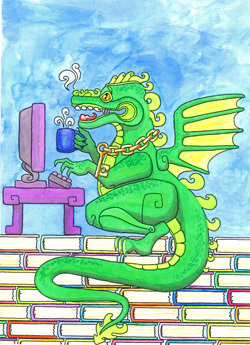Stuff and Sense
First some cool stuff… Then the “sense” – the answer to a question I’ve been asked several times about the planet Artemis.
Cool Stuff 1: Tori Hansen has done an original painting for the cover of my forthcoming Wanderings on Writing. I love it – especially since it captures something that I think is all too often missing from books on writing – the sense of fun!

Wanderings on Writing cover art
Cool Stuff 2: Want a chance to win either an audiobook or signed hard cover of Artemis Awakening? Take a look at my official Facebook page for details…
Cool Stuff 3: I’m experimenting with Twitter @JaneLindskold.
Cool Stuff 4: The cover art for Artemis Invaded is nearly done. As soon as a final version is available, I’ll be sure to share it!
Now for the question… This is a pretty direct quote:
“Why can Griffin understand the language of Artemis? I understand that he studied it in advance of going to find the planet, but something like five hundred years have passed. Wouldn’t it have changed more?”
The answer is that languages don’t change without reason. In fact, left in isolation, a language will change very little. In his book The Adventures of English: The Biography of a Language Melvin Bragg provides a very entertaining discussion of how and why English evolved as it did – and why it still is evolving.
The biggest reason for a language to change is for the culture speaking the root language to be conquered by another culture. This culture then imposes, with greater or lesser success, its own language on the conquered people. Sometimes this leads to the original language dying out. Sometimes – as with English – the root language adapts.
Trade is another way that new words enter a language. So is conquest, where the language of the conquerors takes on terms from the subjugated people – often for goods, services, or cultural traditions that the original culture lacked.
But language doesn’t change without a reason. Bragg provides two examples of languages that remained “preserved in the amber of history.” These are Gullah, a dialect spoken in the Sea Islands and coastal areas of the southeastern United States, and a Cornish dialect spoken on the island of Tangier. In both cases, the relative isolation of the populations led to the very little change in the language.
Artemis has far more in common with the people of the Sea Islands and Tangier than it does with the nations of Europe. Although it is a planet, as far as outside influences go, Artemis might as well be an island. In its entire history, it has not been conquered, nor has it entered into trade.
Artemis is not a “natural” society. Its population was created for a specific purpose. That purpose was best served if all the population spoke one language, so it was given a language complex and diverse enough to enable its population to cope in all anticipated situations. When the seegnur visited the planet, they used this local language. On Artemis no tower of Babel was built, nor did it fall, fragmenting speech into diverse forms.
Of course there are specialized vocabularies, especially related to climate and trade, that might not be shared by all the residents of the planet, but, what is key here is that the same words for the same items or actions or situations are used.
White is always white, never blanc or laven. Black is black, not nero or kuroi. Once a word is learned, it would carry over to any other part of the planet.
What about slang?
Slang usually develops within subsections of the population that, for one reason or another, don’t want to be understood by the larger population. On Artemis, slang has always been frowned upon because it would restrict communication with the seegnur. This provision has held during the five hundred years since the slaughter of the seegnur and death of machines, since most of the population lives in faithful waiting until the seegnur come again.
How about jargon?
Jargon differs from slang in that it is usually specific to a profession, either as a verbal shorthand for commonly used terms or to name new developments. Probably some bits of professional jargon have evolved, but not as many as you might suspect. The people of Artemis are conservative – and I mean this in the old sense of the word “to conserve” or “ to preserve.” Moreover, the lack of scientific and industrial development has meant that there has been very little need for new words.
Languages change for a reason. At least in the parts of Artemis that Griffin has explored to this point, there has been no reason for the language to change. Will this always be the case? That remains to be seen…





